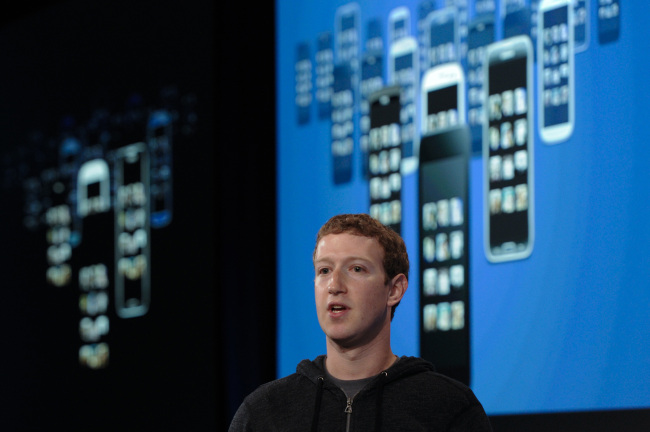 |
Mark Zuckerberg, chief executive officer of Facebook Inc., speaks during an event in Menlo Park, California. (Bloomberg) |
WASHINGTON (AFP) ― With a big, bold deal for hot messaging service WhatsApp, Facebook is demonstrating it wants youth, a wider footprint in more markets and new kinds of services to stay fresh.
Analysts say the staggering price tag of up to $19 billion in stock and cash highlights Facebook’s drive to be more mobile, global and to remain innovative.
“It shows the continued determination of Facebook to be the ‘next’ Facebook,” says Benedict Evans, a partner in the venture capital firm Andreessen Horowitz.
Evans said Facebook is responding in part to the explosion of mobile social apps and wants to assert itself as the dominant platform.
“Any smartphone app is just two taps away,” Evans says in a blog post. “So it’s quite possible mobile social will have lots of services indefinitely. This creates opportunities, but also a pretty basic challenge to Facebook.”
Still, the news left many observers stunned that Facebook would pay such a steep price at a time when the world’s biggest social network seemed to be riding high.
“The size of this deal is really massive and it will get people talking about a bubble,” Greg Sterling at Opus Research told AFP.
Sterling said the deal is a risk for Facebook because “in social media you have a flavor of the month, and next year we might have another app with extremely rapid growth.”
“I think (the high price tag) comes from the frustration of not being able to buy (the messaging service) Snapchat, and then there is the youth factor,” Sterling added.
“Facebook really needs to have vehicles to attract younger users, and Instagram is not going to do that by itself.”
With this strategy, Sterling said Facebook “is becoming a kind of holding company for different social media properties that appeal to different groups.”
Jim Goetz at the venture firm Sequoia Capital, an early WhatsApp investor which is getting a huge return, said the price makes sense because “WhatsApp has completely transformed personal communications, which was previously dominated by the world’s largest wireless carriers.”
Goetz noted that WhatsApp, which allows users to bypass telecom charges for messaging, is “so widely loved overseas and so under appreciated at home.”
He said WhatsApp has grown faster than any similar company to 450 million users and has just 32 engineers. The business model is simple ― no advertising, and users are charged $1 per year after the first year, which is free.
This has resonated with users around the world, in places ranging from Botswana to China.
The mega-deal announced on Wednesday bolsters the world’s biggest social network ― which has more than 1.2 billion members ― with WhatsApp, which will be operated independently with its own board.
Facebook founder and chief Mark Zuckerberg said that WhatsApp was worth the money because its blistering growth around the world has it on a clear path to hit a billion users.
“Services with a billion people using them are all incredibly valuable,” Zuckerberg said while discussing the purchase price during a conference call with analysts.
The purchase includes $12 billion in Facebook shares and $4 billion cash.
It calls for an additional $3 billion in restricted stock units to be granted to WhatsApp founders and employees that will vest over four years.
Roger Kay at Endpoint Technologies said WhatsApp has become one of the most popular mobile applications and “reminds me a little of Skype.”
Kay said the deal makes sense on one level because of Facebook’s record stock run-up.
“When you have a stock like that which has run up quickly and created a lot of paper value, it’s good to trade that for other value,” he told AFP.
Forrester Research analyst Nate Elliott said Facebook gets a fresh infusion of youth but much more with the deal.
“It’ll be tempting to read this as a sign Facebook is scared of losing teens,” Elliott said.
“But the reality is, Facebook always works hard to keep all its users engaged, no matter their age. Facebook is tireless in its efforts to keep users coming back. That’s why their 1.2 billion monthly users keep visiting the site more and more frequently, rather than drifting away.”








